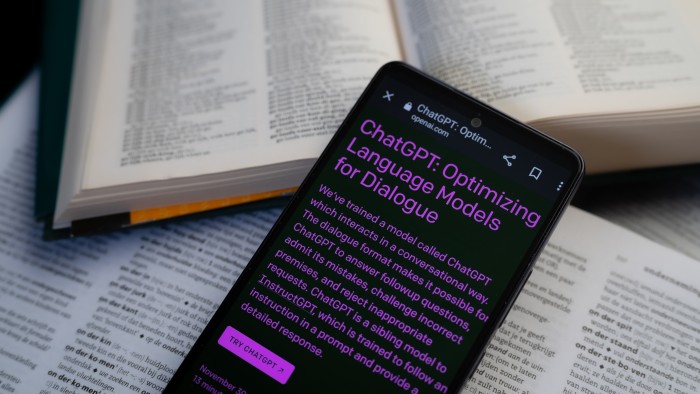Can business schools teach leaders when AI is the real deal?

Roula Khalaf, Editor of the FT, selects her favourite stories in this weekly newsletter.
If one thing is almost guaranteed to follow innovation, it is hype. New technologies garner great interest but much of it is overstated or inaccurate.
“From crypto to non-fungible tokens to the metaverse, we’ve seen some pretty stupendous hype around dubious technologies,” says Henry Ajder, an expert and adviser on generative artificial intelligence and synthetic media — images, text or voice generated using AI.
AI is the latest big trend in technology but, unlike many of its predecessors, it has significantly more applications, Ajder reckons. He describes it as “legitimately different from those other hype cycles”, with an opportunity to create clear and meaningful change.
For more senior leaders on executive MBA programmes, identifying the real value will be vital to avoid wasting resources and reputations on AI projects that cannot live up to their promise.
People working in — and with expertise in — technology are keen not to write off the potential of AI.
The ability of ChatGPT and its rivals to quickly spit out responses to questions has raised the bar for workers, says Chirag Mahawar, chief of staff for the chief executive’s office at Quolum, a “software as a service” company.
“If the boss has asked preliminary questions around a subject and asks the same to ChatGPT, the average worker’s response might be of a similar quality, or ChatGPT could be higher,” he says. “You have to sharpen your existing skills — if an AI tool can pop out an answer in a few seconds, why should my supervisor wait for a day or two for the same advice?”
Ajder, who has spent years exploring topics around generative AI — an industry that has been professionalising and commercialising since before the pandemic began — agrees that there are a number of potential use cases.
“I wouldn’t want to be down on it — I do think there are some useful applications,” he says. “But, before you rush headfirst into something, you have to ask whether the tech is mature enough to actually deliver the value you want out of it.”
For example, publications using AI to generate articles have been scuppered by so-called “hallucinations”, when systems simply invent inaccurate facts — an embarrassing and potentially costly error. Ajder says this is the consequence of fear of missing out and a rush to market, comparing it to companies that rushed to create virtual storefronts in the myriad of now largely deserted and technically disappointing metaverses.
Business schools also need to ensure that students can dig into what a system actually offers, with many AI start-ups becoming less impressive under close scrutiny, he says.
“You have to analyse whether a product is just an application programming interface (API) with a nice wrap that’s at the mercy of OpenAI or Google or whoever’s providing the baseline,” he says. “Fomo [fear of missing out] can lead to companies mistaking novelty for actual revolutionary technology.”
Alex Connock, senior fellow in management practice at the University of Oxford’s Saïd Business School, says that there is “both substance and hype” around generative AI, noting that there have been almost 2,200 start-ups in the field since January.
“There is a start-up for every function of daily life, and most cannot succeed,” he says. “While the festive season of 2022 was defined by venture capitalists cancelling their holidays to work on AI investments, by the end of this summer we saw falling demand.”
Connock sees parallels with Hollywood, where this year’s box office winners showed evidence of human creativity.

“We have indeed seen movies made this summer that were retreads of the training data set — of the kind that AI could write, by reorganising the patterns of past data to create a new and synthetic iteration,” Connock says. But, he adds: “The films that did well were actually the ones that let human ingenuity and originality run free.” Connock’s parallel around human creativity offers hope for business school students concerned about their futures in a working world where AI systems are being touted as their replacements.
“All the skills that you really learn at business school are going to be more important than ever: presenting, coherent storytelling, analysis, charismatic persuasion, writing original material, structuring original ideas,” he says. “These are the skills that will prevail in the boardrooms of the next decade.”
In an era of AI disruption and continual uncertainty, Connock looks to another unexpected source of inspiration — Franz Liszt, who said: “My sole ambition as a composer is to hurl my javelin into the infinite space of the future.”
Connock says, “My advice to students is to enter the workplace with a clear view of what value your perspective can contribute, to be AI-literate at every level, but not AI-paranoid. If you approach the future with your own firm vision, then that’s as good as you can do.”

Comments